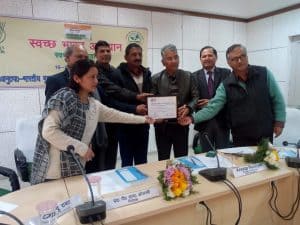Imagine 2600 trucks laden with plastic waste plying across cities, depositing them at waste processing centres to the extent that they can handle it, and merely dumping the rest at various spots. Well, that is the amount of plastic waste that India generates daily — a massive 26000 MT of plastic waste every day.
And that is precisely why solutions like those being tried out in the hill town of Dehradun may emerge as an example for all our cities, as they try to tackle the growing problem of plastic pollution.
Despite several regulations and policies, single-use plastic continues to pollute our ecosystem. Government initiatives like Swachh Bharat Mission and Swachh Survekshan have created positive results for a few cities like Indore, Bhopal, Ambikapur, Chandigarh which are practicing source segregation, creating automated material recovery facilities, hosting zero waste events and promoting alternatives.
The challenge is that such green practices are yet to be scaled up and replicated at a pan nation level across every city and town.
Plastic problem in Dehradun
Dehradun, the capital city of Uttarakhand, witnesses the production of more than 300 MT of solid waste per day. Most of it is taken to Dehradun’s only waste management processing plant, Shishambada. The city generates close to 25-30 MT of plastic waste every day, out of which the majority is single-use plastic.
Drains, vacant plots, rivers, roads and forests are some of the places where this plastic often ends up getting dumped. With the large influx of a floating population, the city faces an additional burden when it comes to management of waste generated.
Growing real estate, expanding markets and the upcoming mall culture are further adding to the problem of sustainable waste management. The culture of street food is a new cause of concern that ends up polluting large stretches of the road right in the middle of the city. Neighbouring cities of Rishikesh and Haridwar also face a similar problem.
Also read: ► How 5000 school kids in Dehradun helped put 550 kilos of plastic waste where it belongs ► Plastic waste in roads: Is that the solution cities must consider? ► Where does the plastic waste in Indian cities go? ► Beat plastic: Yes, but how?
The solution
In such a scenario, Dehradun has shown sparks of positivity and enthusiasm in curbing the challenge of plastic pollution. Several stakeholders have taken a number of steps at the local and state levels to address the impending plastic pollution crisis in the region. One such noteworthy initiative has come from the Council for Scientific and Industrial Research – Indian Institute of Petroleum (IIP), Government of India.
IIP has been a pioneer institute in leveraging the power of technology and innovation in overcoming complex traditional problems. It was IIP that produced indigenous bio-fuel which powered the first-ever Indian Air Force flight in the nation. The Institute has produced several other such path-breaking scientific and technological solutions.
On August 27 2019, Union Minister for Health, Dr Harshvardhan and Chief Minister of Uttarakhand, Trivendra Singh Rawat inaugurated the first government plastic waste to fuel plant in India. The plant has the capacity to convert 1000 kgs of plastic waste into 800 litres of diesel or 700 litres of petrol, BS-VI quality. And this is where we come into the picture.
Social Development for Communities (SDC) Foundation is currently associated with IIP as its Social Technology Partner in the Plastic Waste to Fuel project. IIP and SDC Foundation together came up with the idea of installing ‘Plastic Banks’ across the city of Dehradun. The primary function of the Plastic Bank is to facilitate community-driven source segregation and establish a plastic waste supply chain for the IIP plant.
In the last four months, 11 Plastic Banks have been installed by IIP and SDC Foundation. In the initial phase, Plastic Banks are being installed at places that produce bulk quantities of plastic waste. Schools, automobile dealerships, hospitals, government offices and hotels are some of the places where the Plastic Banks have been installed successfully so far.
Plastic Banks are based on a three-pronged approach. They facilitate source segregation, encourage participation from the community and ensure scientific recycling.
A set of collection bags along with a tool kit is provided to the institutions that agree to install Plastic Banks on their campus. A brief capacity building session is also organized in order to make them familiar with the process of segregation, the types of plastic to be segregated and how their waste will be recycled.
A ‘Certificate of Recognition’ is also issued jointly by IIP and SDC Foundation to motivate and acknowledge the efforts of the organizations towards beating plastic pollution.
A collection team collects the plastic waste on a routine basis from the Plastic Banks and delivers it to IIP for recycling.
Till date, more than 1800 kilograms of plastic waste have been collected and sent for recycling from the chain of Plastic Banks in Dehradun.
Efforts are underway to expand the scope of Plastic Banks by including municipal bodies and other bulk waste generators.

A ‘Certificate of Recognition’ is issued jointly by IIP and SDC Foundation to motivate and acknowledge the efforts of the organizations towards beating plastic pollution.
Plastic Banks have received a warm response from the citizenry at large. If replicated, the model has the potential to achieve the goal of decentralized management of plastic waste which can ease the burden on the landfills and dumping grounds.
It will further ensure recycling as well as less leakage of plastic waste in the natural environment. Plastic Banks have turned out to be an excellent way to educate the masses about plastic pollution and trigger behavioural change among the community at large.